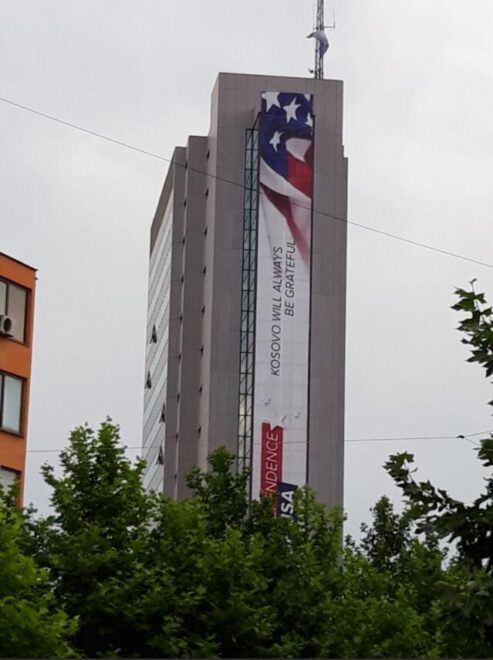Kosovo Relations with the West
Euro-Atlantic integration
The European Union is formally the most important international actor in Kosovo. On the one hand, the EU has extensive organizational structures in Kosovo, which include the EU office including the EU representative and the office of the European Commission, the EULEX mission and the liaison offices of the member states. In its relations with the EU, Kosovo is taking part in the Stabilization and Association Process (SAP) as a potential candidate country. On October 27, 2015, the EU and Kosovo signed a Stabilization and Association Agreement(SAA), which unblocked Kosovo’s path to EU membership for the first time. However, due to the split in the EU on the question of recognition, the Union created a special construction – Kosovo was the first and only (potential) candidate country in the history of enlargement policy to sign an agreement with the EU, not with the member states. In terms of content, the SAA comprises the following areas: political dialogue, free trade, free movement of capital, labor and services, adaptation of the legal status to the acquis communautaire, justice and regional cooperation. According to estimates, the SAA leads to a loss of revenue of 24 million euros due to lower customs revenues. Kosovo receives EU funding from several programs. Most important is the instrument for pre-accession assistance (IPA II), which has a volume of € 645.5 million for the period 2014 to 2020.
The next contractual step with the EU that Kosovo is striving for is an agreement on visa liberalization. According to INTERNETSAILORS, Kosovo is the only country in the Western Balkans that has not yet been able to conclude a visa liberalization agreement with the EU. Talks have been underway between the European Commission and Kosovo about a possible liberalization of visa regulations for the country since 2012. The implementation of the European Commission’s visa-free conditions were overshadowed in 2014-17 by the partly militant conflict of the opposition led by the VV at the time against the border demarcation agreement agreed by the government with Montenegro. Although Kosovo had to implement more conditions than all neighboring countries before and the EU Commission has certified Kosovo since 2018 that it has met all conditions, various EU member states have since blocked a positive EU decision. This blockade, which is due to the general climate on migration in the EU, has massively damaged the image of the EU in Kosovo, among the political elite and the citizens. In addition to the countries that traditionally take a blocking stance such as France and the Netherlands, the discussion was also made more difficult in 2019 by the fact that the Federal Government, under the leadership of the Interior Ministry, switched from a supportive to an ambivalent stance by Interior Minister Seehofer. Despite continued support for a positive decision on the part of the European Commission and European Parliament, there are no signs of a breakthrough in the visa issue in 2020 either.
In addition to EU integration, Kosovo is striving for membership in NATO as a central foreign policy goal. Achieving this goal depends directly on the permanent solution of the status conflict with Serbia, on the one hand because NATO is present with the KFOR mission in Kosovo for so long, and on the other hand because several NATO members have not recognized Kosovo.
United States
Traditionally, the United States has by far the greatest respect and political influence of the Western states. This goes back to the leading role of the US in the Balkan Wars of the 1990’s, especially in the negotiations with Serbia, and the Kosovo War in 1999, as well as later in support for the proclamation of independence in 2008. Former US President Bill Clinton is a central boulevard in the city center of the capital Prishtina, in a square on the street there is a bust of Clinton. The USA continues to provide the largest contingent of KFOR with around 600 men. The reputation of the United States has suffered significantly under the Trump administration and its support for a 2018-19 area exchange agreement.
Germany
The relations between Kosovo and Germany have traditionally varied and good. Along with Switzerland and Austria, Germany was one of the main destination countries for labor migration during the former Yugoslavia in the 1970’s and 1980’s. In the 1990’s, political refugees followed their relatives to Germany. The European headquarters of the LDK was then in Stuttgart and the seat of the Kosovar government-in-exile in the FRG capital Bonn. When Chancellor Merkel took over the political leadership role in the EU in the political dialogue between Kosovo and Serbia in 2012-13, Germany has become Kosovo’s second key political partner alongside the USA.
The issue of migration has also shaped relations with Germany since 2015.
End of 2014, beginning of 2015. Out of desperation about the political and economic situation in their home country, tens of thousands of Kosovars used the possibility of legal entry into Serbia to reach the EU in the north in the province of Vojvodina over the green border to Hungary. With the help of smugglers, they made their way to the EU, with the goal of Germany (as well as Switzerland and Austria). In January and February 2015 alone, almost 10,000 asylum applications were submitted by Kosovar citizens in Germany.
This wave of migration largely came to a standstill in the late spring of 2015 after Germany and the other affected European countries had initiated numerous measures in cooperation with Kosovo, in particular the declaration of Kosovo as a safe country of origin. The Federal Office for Migration and Refugees coordinated a Kosovo return project called “URA 2”. In May 2015, the GIZ country office in Kosovo opened the German Information Center for Migration, Training and Careers (DIMAK), which advises returnees on training and career opportunities in Kosovo as well as on legal labor migration to Germany.



